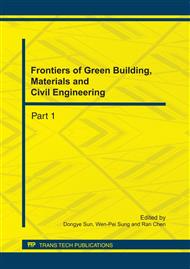[1]
H. Mitsuhashi and H.R. Greve. A matching theory of alliance formation and organizational success: Complementarity and compatibility. The Academy of Management Journal, 2009, 52(5): 975-995.
DOI: 10.5465/amj.2009.44634482
Google Scholar
[2]
R. Culpan. A fresh look at strategic alliances: research issues and future directions. International Journal of Strategic Business Alliances, 2009, 1(1): 4-23.
DOI: 10.1504/ijsba.2009.023649
Google Scholar
[3]
R. Cellini and L. Lambertini. Dynamic R&D with spillovers: Competition vs cooperation. Journal of Economic Dynamics and Control, 2009, 33(3): 568-582.
DOI: 10.1016/j.jedc.2008.08.006
Google Scholar
[4]
D. Li, et al. Friends, acquaintances, or strangers? Partner selection in R&D alliances. The Academy of Management Journal, 2008, 51(2): 315-334.
DOI: 10.5465/amj.2008.31767271
Google Scholar
[5]
C.F. Cheng, M.K. Lai, and W.Y. Wu. Exploring the impact of innovation strategy on R&D employees' job satisfaction: A mathematical model and empirical research. Technovation, 2010, 30(7-8): 459-470.
DOI: 10.1016/j.technovation.2010.03.006
Google Scholar
[6]
G. Villani. An R&D investment game under uncertainty in real option analysis. Computational Economics, 2008, 32(1): 199-219.
DOI: 10.1007/s10614-008-9133-7
Google Scholar
[7]
E. Bompard, et al. A game theory simulator for assessing the performances of competitive electricity markets. Electric Power Systems Research, 2008, 78(2): 217-227.
DOI: 10.1016/j.epsr.2007.02.007
Google Scholar
[8]
Z. Ge and Q. Hu. Collaboration in R&D activities: Firm-specific decisions. European Journal of Operational Research, 2008, 185(2): 864-883.
DOI: 10.1016/j.ejor.2007.01.020
Google Scholar
[9]
M. Nagarajan and G. Sosic. Game-theoretic analysis of cooperation among supply chain agents: Review and extensions. European Journal of Operational Research, 2008, 187(3): 719-745.
DOI: 10.1016/j.ejor.2006.05.045
Google Scholar
[10]
M. Esmaeili, M.B. Aryanezhad, and P. Zeephongsekul. A game theory approach in seller-buyer supply chain. European Journal of Operational Research, 2009, 195(2): 442-448.
DOI: 10.1016/j.ejor.2008.02.026
Google Scholar
[11]
A. Sadeghi and M. Zandieh. A game theory-based model for product portfolio management in a competitive market. Expert Systems With Applications, (2010).
DOI: 10.1016/j.eswa.2010.11.054
Google Scholar
[12]
E. Semsar-Kazerooni and K. Khorasani, Multi-agent team cooperation: A game theory approach. Automatica, 2009, 45(10): 2205-2213.
DOI: 10.1016/j.automatica.2009.06.006
Google Scholar
[13]
G. Kol and M. Naor. Cryptography and game theory: Designing protocols for exchanging information. Theory of Cryptography, 2008: 320-339.
DOI: 10.1007/978-3-540-78524-8_18
Google Scholar


